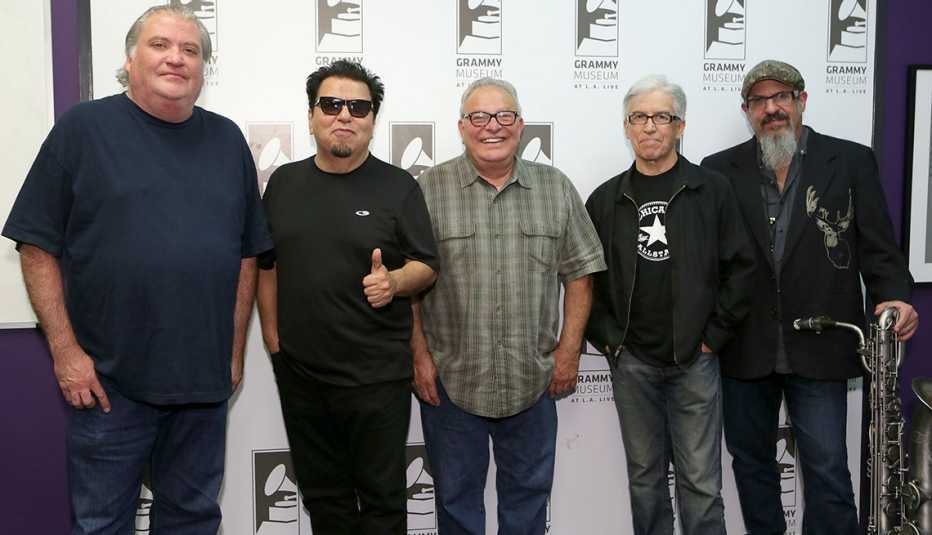How did ‘Native Sons’ get started?
We were touring when we signed a record deal with New West in the fall of 2019. The normal window for us to make a record is two months, and we didn't have that window. The thought was: How about a covers record? We could do it in fits and starts between tour dates. Little did we know what would happen in 2020. The L.A. theme was my idea. A focus, even a broad focus, keeps us in a lane and gives us something to talk about at the end of the process.
How did you deal with recording during the pandemic?
We started in February, then, boom, everything shuts down. Touring and traveling is done, obviously. As things opened up a bit, we were able to get together again. The studio we used in East L.A. is big, so we were able to spread out. We had a nurse test us before every session. We wore masks. We took every precaution we could, and we were able to pull it off. I was working quite a bit last year. I started a few records before the lockdown that I was able to finish. I made three records with people I never met.
You're non-Hispanic, Jewish, from Philadelphia and came aboard 11 years after Los Lobos was founded. Did you ever feel like the odd man out?
In Philadelphia, I had zero exposure to Latin culture. When I left, there wasn't a Mexican restaurant there. But the guys were so welcoming from the beginning. I didn't feel like an outsider. And our families are very similar. We're all second-generation Americans. My grandparents came from Russia. Theirs came from Latin America. We're also informed by ‘60s underground radio. And we were all fans of Fleetwood Mac and weird British pop bands. There was more commonality than you would think. That's one of the things we wanted to say with this record.
Was there debate on which Beach Boys song to cover?
We're all Beach Boys fans but Conrad was adamant that we do a Mike Love song and we settled on “Sail On, Sailor” to keep him happy. That one presented the biggest challenge to make our own.
Mainstream pop hits are 180 degrees from Lalo Guerrero's “Los Chucos Suaves” and Willie Bobo's “Dichoso,” both of which you cover on ‘Native Son.’
Songs like these are big hits in East L.A. and nowhere else. “Dichoso” goes back to the wedding era when the band played it two or three times a night. Lalo was a big influence on the guys growing up and a big part of Mexican culture in the ‘50s. He was a zoot-suiter, a political gadfly and a promoter of East L.A. culture doing these funny, R&B-influenced records, kind of a combination of Elvis Presley and Mort Sahl. We did a children's album (Papa's Dream) with him. There were a few people we knew we'd highlight: Lalo, War, The Blasters. Those were no-brainers.
With COVID rising again, how nervous are you about touring?
Come August, we'll be playing every weekend for a year. I feel generally safe. I doubt we'll all feel as safe as we did before we heard the word COVID. I probably read too much about variants. It feels like the vaccine is effective against everything that's showed up so far.
Explain the band's longevity.
There were seven years of hard work before anybody outside of their neighbors knew who Los Lobos was. The band would literally just play around East L.A. and then they got involved doing concerts for these emerging Chicano studies programs in the University of California system. They labored and learned songs and studied these traditions and grew up outside the spotlight. They worked out a lot of stuff, like how to be together and not be at each other's throats. And the guys had families really young. When they showed up on the scene, they had two or three babies at home. Nobody was footloose and fancy free. We never did the no-fixed-address, three months on the road kind of tour, which makes you hate your bandmates. The third thing is there's never any unfulfilled ambition. I can do an a capella barbershop record. There are no limits as long as you show up when it's time to hit the road or record.
Edna Gundersen, a regular AARP music critic, was the longtime pop critic for USA Today.





































































More on entertainment
AARP Presents 'Smokey Wrote That'
Motown legend and prolific songwriter Smokey Robinson tells the stories behind timeless hitsEvery Essential Album (and Music Video) From the Golden Age of MTV
Because it's time to get your Big '80s onThe Incredible Zen of Being Sting
With a new album, audio memoir and coming residency in Las Vegas, he puts life — and art — in perspective